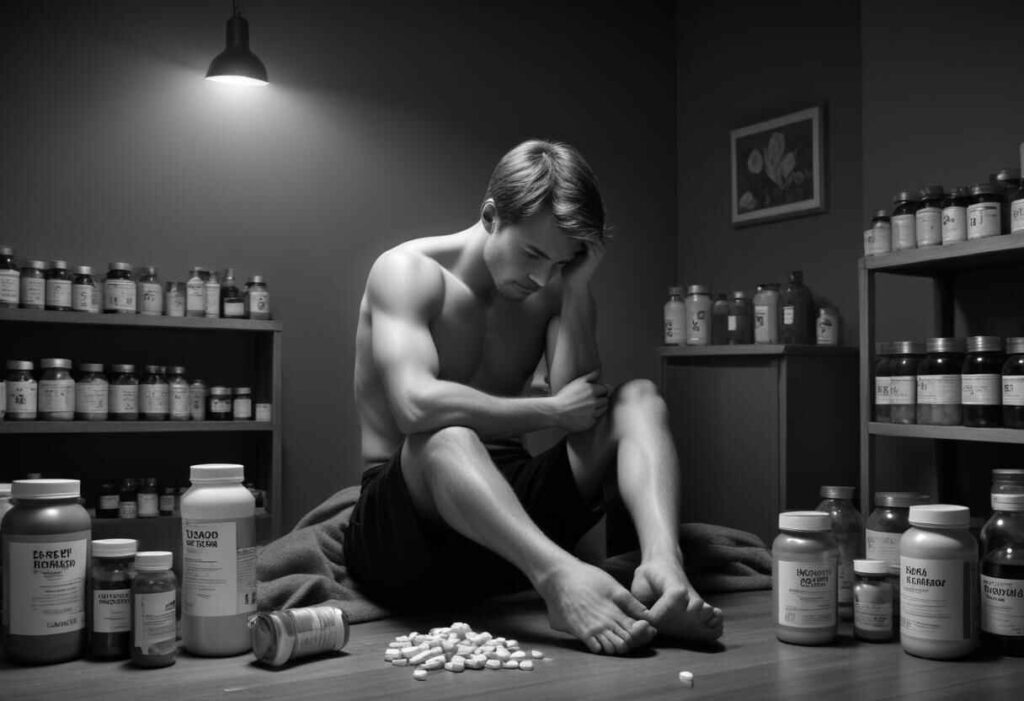Vitamin D is really important for our health. It helps us soak up calcium, which makes our bones strong. It also helps our immune system, mood, and cells work right. Many people, however, don’t receive enough of it. This article will help you understand why some people don’t have enough vitamin D and what happens when you’re low on it. Plus, it’ll show you how to boost your levels naturally or with supplements.
Why Do We Need Vitamin D?
Think of vitamin D like the conductor of an orchestra. It makes sure all the other important nutrients do their jobs well. Here are some important things vitamin D does:
- Keeps Bones Strong: Vitamin D helps our bodies absorb calcium, which is super important for strong bones. Not getting enough can make your bones weak and break easily, especially when you get older.
- Helps Muscles Work: Having enough vitamin D keeps your muscles healthy and strong. If you don’t have enough, your muscles might feel weak and achy.
- Supports Your Immune System: Vitamin D helps your body fight off sickness. If you’re low on vitamin D, you might get sick more often.
- Keeps Your Mood in Check: Some studies show that vitamin D might help with your mood. Not having enough has been linked to feeling more sad or down.
| Reason | Role of Vitamin D | Impact on Health | Consequences of Deficiency |
| Bone Health | Vitamin D helps the body absorb calcium, which is essential for strong bones and teeth. | Supports bone density and reduces the risk of fractures and osteoporosis. | Rickets in children, osteomalacia, and osteoporosis in mature person. |
| Immune System Support | Enhances the pathogen-fighting effects of monocytes and macrophages, key components of the immune defense. | Boosts immunity and reduces the risk of infections. | Increased susceptibility to infections and immune-related disorders. |
| Mood and Mental Health | Plays a role in brain function and the regulation of mood. | Helps prevent depression and mood disorders. | Higher risk of depression, anxiety, and cognitive impairment. |
| Cardiovascular Health | Contributes to the regulation of blood pressure and heart function. | Supports overall heart health and circulation. | Higher risk of cardiovascular diseases and hypertension. |
| Muscle Function | Essential for muscle function and strength. | Promotes healthy muscle contractions and reduces the risk of falls. | Muscle weakness, pain, and increased risk of falls. |
| Chronic Disease Prevention | Linked to the regulation of inflammation and cell growth. | May reduce the risk of chronic diseases like diabetes and certain cancers. | Increased risk of chronic conditions and inflammatory diseases. |
What Causes Vitamin D Deficiency?
Lots of things can make it hard for your body to get enough vitamin D:
- Not Enough Sun: Sunlight helps your body make vitamin D. If you don’t get much sun because you live in a place with cloudy weather or you don’t spend a lot of time outside, you might not make enough vitamin D.
- Darker Skin: The pigment in your skin can make it harder for sunlight to make vitamin D. If you have darker skin, you might need more time in the sun to get the same amount of vitamin D as someone with lighter skin.
- Not Eating the Right Foods: There aren’t many foods with lots of vitamin D naturally. If you don’t eat enough fish, eggs, or foods with added vitamin D, you might not get enough.
- Some Health Problems: Certain health issues, like problems with your stomach or intestines, can make it hard for your body to absorb vitamin D from food.

Signs and Symptoms of Deficiency
When you don’t have enough vitamin D, you might not notice it at first. Still, the following are some possible outcomes:
- Feeling Tired: You may experience an increase in fatigue.
- Weak Muscles: Your muscles might feel weak or achy.
- Getting Sick a Lot: You might get sick more often.
- Bone Hurts: Your bones might hurt, especially in your back or legs.
- Hard to Focus: It might be harder to pay attention or remember things.
- Feeling Sad: You might feel sad or down more often.
Natural Ways to Boost Vitamin D
Here are some simple ways to get more vitamin D:
- Sunshine: Spend some time outside in the sun, but not too much to get sunburned. About 15-20 minutes a few times a week should do it. How much time you need depends on your skin color, where you live, and the time of year. But remember, always be careful in the sun. Try to avoid being out when the sun is strongest, and use sunscreen after the first bit of time outside.
- Eat the Right Foods: Include foods in your meals that naturally have lots of vitamin D. These are things like fatty fish (like salmon or tuna), egg yolks, cod liver oil, and certain mushrooms that have been in the sun.
- Look for Added Vitamin D: Some foods have extra vitamin D added to them. Check labels on things like milk (even non-dairy kinds), cereal, orange juice, and yogurt to see if they have added vitamin D.

| Natural Method | Details | Good Practices | Additional Benefits |
| Sunlight Exposure | Sunlight triggers vitamin D synthesis in the skin. | Aim for 10-30 minutes of midday sun exposure several times a week, depending on skin tone and location. | Enhances mood and supports circadian rhythm. |
| Fatty Fish | Salmon, mackerel, and sardines are rich in vitamin D. | Consume fatty fish 2-3 times per week. | Provides omega-3 fatty acids and supports heart health. |
| Egg Yolks | Egg yolks contain a small amount of vitamin D. | Include eggs in your diet regularly, particularly from at no cost-range chickens. | Source of protein and other essential nutrients. |
| Fortified Foods | Foods like milk, orange juice, and cereals are often fortified with vitamin D. | Check labels for vitamin D fortification and consume as part of a balanced diet. | Simple way to increase vitamin D intake in daily meals. |
| Mushrooms | Some mushrooms exposed to sunlight (like maitake or portobello) have vitamin D. | Eat sun-exposed mushrooms regularly, either raw or cooked. | Low in calories and a good source of fiber and antioxidants. |
| Supplements | Vitamin D supplements can help maintain adequate levels. | Consult with a healthcare provider for appropriate dosage. | Helps support immune function and bone health. |
Taking the Right Amount of Supplements
If changing what you eat and being in the sun more doesn’t help, your doctor might suggest taking vitamin D pills. There are two main types: D2 and D3. D3 is usually easier for your body to use. How much you should take depends on what your doctor thinks which is most effective for you based on your own needs and how much vitamin D you have in your body now. Always talk to your doctor before taking any supplements, because too much vitamin D can be harmful.

